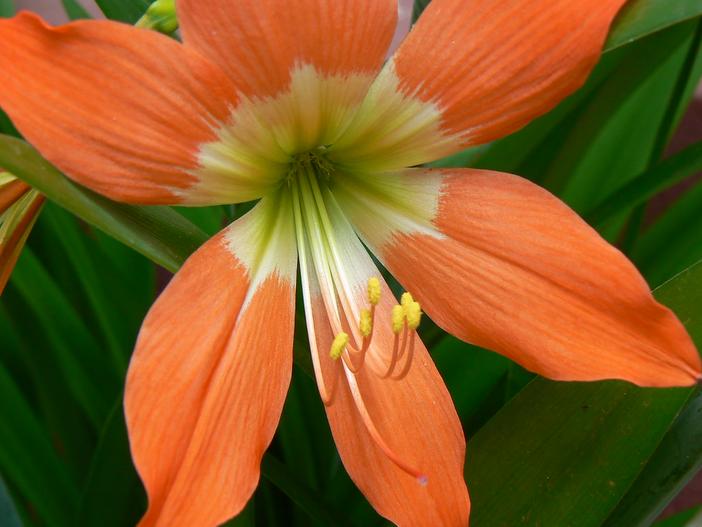Barbados Lily
(Hippeastrum puniceum)
Barbados Lily (Hippeastrum puniceum)
/
/

Dinesh Valke
CC BY-SA 2.0
Image By:
Dinesh Valke
Recorded By:
Copyright:
CC BY-SA 2.0
Copyright Notice:
Photo by: Dinesh Valke | License Type: CC BY-SA 2.0 | License URL: https://creativecommons.org/licenses/by-sa/2.0/ | Uploader: Dinesh Valke | Publisher: Flickr


























Estimated Native Range
Summary
Hippeastrum puniceum, commonly known as Barbados Lily, is a deciduous perennial herb native to tropical and subtropical regions of Central America and northern South America. It reaches a height of 1-2 feet and a width of about 1 foot. The plant is known for its striking trumpet-shaped flowers, which are typically a vibrant red with a throat that may be a contrasting color, such as green or white. The blooming period extends from late winter through summer, providing a long season of visual interest. The flowers are quite showy and can add a splash of color to any garden setting.
Barbados Lily is valued for its ease of care and the bright, exotic appearance of its flowers. It is often used in container plantings, borders, and as an indoor plant. In terms of cultivation, it prefers full sun to partial shade, consistent moisture, and well-draining soil. While it can tolerate medium amounts of water, overwatering should be avoided to prevent bulb rot. Hippeastrum puniceum can be propagated by separating offsets from the parent bulb. Gardeners should be aware that it is potentially invasive in some regions, such as parts of the United States, and should check local regulations before planting.CC BY-SA 4.0
Barbados Lily is valued for its ease of care and the bright, exotic appearance of its flowers. It is often used in container plantings, borders, and as an indoor plant. In terms of cultivation, it prefers full sun to partial shade, consistent moisture, and well-draining soil. While it can tolerate medium amounts of water, overwatering should be avoided to prevent bulb rot. Hippeastrum puniceum can be propagated by separating offsets from the parent bulb. Gardeners should be aware that it is potentially invasive in some regions, such as parts of the United States, and should check local regulations before planting.CC BY-SA 4.0
Plant Description
- Plant Type: Herb
- Height: 1-2 feet
- Width: 0.5-1 feet
- Growth Rate: Moderate
- Flower Color: Orange
- Flowering Season: Winter, Spring, Summer
- Leaf Retention: Deciduous
Growth Requirements
- Sun: Full Sun, Part Shade
- Water: Medium
- Drainage: Medium
Common Uses
Bank Stabilization, Border Plant, Deer Resistant, Drought Tolerant, Fragrant, Low Maintenance, Potted Plant, Rabbit Resistant, Rock Garden, Showy Flowers
Natural Habitat
Native to tropical and subtropical regions of Central America and northern South America
Other Names
Common Names: Belladonna Lily, Easter Lily, Cacao Lily, Cocoa Lily, Amaryllis Lily
Scientific Names: , Hippeastrum puniceum, Hippeastrum equestre, Amaryllis punicea, Amaryllis equestris, Hippeastrum crociflorum, Amaryllis crociflora, Amaryllis equestris var. flore-simplici, Amaryllis equestris var. major, Amaryllis equestris var. plena
GBIF Accepted Name: Hippeastrum puniceum (Lam.) Voss